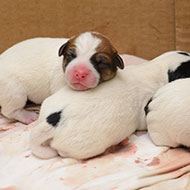
Government estimates that local authorities will need increased funding
The Welsh Government has confirmed that it will revise dog breeding regulations in the country amid a claim that there is likely to be an increase in the funding requirements of local authorities.
Currently, anyone in Wales with three or more breeding bitches meeting certain conditions must be licensed. However, a recent documentary by the BBC revealed that poor breeding practices and welfare concerns are still an issue, even at approved sites.
Following a report on dog breeding published by the Animal Health and Welfare Framework Group, the Welsh Government asserted that breeding laws need to be reexamined, and that local authorities will likely need additional funding in order to enforce animal welfare legislation.
The RSPCA's assistant director for external relations in Wales, Claire Lawson said: "Wales' new dog breeding laws, passed in 2014, marked a big step forward for animal welfare - but the RSPCA has long highlighted that further improvements are necessary.
"It's really welcome that the Welsh Government are looking again at these laws, and that the Minister described this as urgent.
"We'll continue to campaign for more emphasis on tackling genetic issues at breeding establishments, a staff-to-dog ratio that better considers welfare, and possible action to tackle bad cat breeding practices too.
"However, what is really important is that local authorities feel equipped and resourced to enforce animal welfare laws - including on dog breeding, microchipping, equine control and so much else…so the Welsh Government's acknowledgement that more funding will likely be needed is also a hugely positive development."



 The Veterinary Medicines Directorate (VMD) is inviting applications from veterinary students to attend a one-week extramural studies (EMS) placement in July 2026.
The Veterinary Medicines Directorate (VMD) is inviting applications from veterinary students to attend a one-week extramural studies (EMS) placement in July 2026.